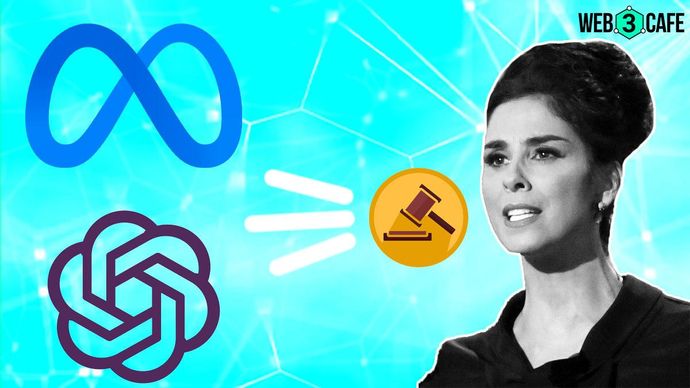Hollywood Actress Sarah Silverman accuses Meta & OpenAI of violating her copyright
The creators of ChatGPT, OpenAI, and Meta are being sued by author Sarah Silverman and others for allegedly violating their copyright.

Highlights
- Silverman, Golden, and Kadrey sue OpenAI and Meta for copyright infringement in US District Court
- The lawsuits claim that the companies utilised their work to train their AI models without obtaining proper consent
- Meta and OpenAI utilised their books without permission
Comedian, Actress and writer Sarah Silverman along with two authors have initiated copyright infringement lawsuits against Meta Platforms and OpenAI, alleging that their content was utilised without their permission to train artificial intelligence language models.
In their proposed class action lawsuits, Silverman, Richard Kadrey, and Christopher Golden claim that OpenAI, the creator of ChatGPT, and Meta, utilised copyrighted content to train chatbots. The claims were filed in federal court in San Francisco on 7 July, 2023.
Lawsuit against OpenAI
The lawsuits claim that OpenAI's ChatGPT and Meta's LLaMA (Large Language Model Meta AI) were trained using datasets that were illegally obtained and included the works of the plaintiffs.
According to the allegations, these datasets were sourced from ‘shadow library’ websites such as Bibliotik, Library Genesis, Z-Library, and others. The lawsuits specifically mention that the books in question were accessible in large quantities through torrent systems.
As presented in the OpenAI lawsuit, the plaintiffs have provided evidence demonstrating that when prompted, ChatGPT generates summaries of their books, thereby infringing on their copyrights. Exhibits included in the lawsuit showcase examples where ChatGPT summarises Silverman's book ‘Bedwetter,’ Golden's book ‘Ararat,’and Kadrey's book ‘Sandman Slim.’ The claim further asserts that the chatbot fails to reproduce any of the copyright management information that the plaintiffs had included in their published works.
The complaint claims that regardless of the summaries' errors, ChatGPT ‘retains knowledge of particular works in the training dataset.’
What’s the lawsuit against Meta’s LLaMA?
In the separate lawsuit against Meta, the plaintiffs allege that their books were included in the datasets used by Meta to train its LLaMA models.
The complaint provides a step-by-step explanation of why the plaintiffs believe these datasets have unlawful origins. In a Meta paper discussing LLaMA, the company references the sources of its training datasets, one of which is referred to as ThePile. The lawsuit highlights that ThePile was described in a paper by EleutherAI as being compiled from ‘a copy of the contents of the Bibliotik private tracker.’
Both lawsuits assert that the authors did not provide consent for their copyrighted books to be used as training material for the companies' AI models. Each lawsuit includes six counts encompassing various copyright violations, negligence, unjust enrichment, and unfair competition.
The attorneys representing the three authors, Joseph Saveri and Matthew Butterick, have expressed on their LLMlitigation website that they have received inquiries from writers, authors, and publishers who are concerned about ChatGPT's remarkable ability to generate text-resembling copyrighted materials, including thousands of books.
As of now, Meta and OpenAI have not provided any immediate response or comments regarding the lawsuits.
